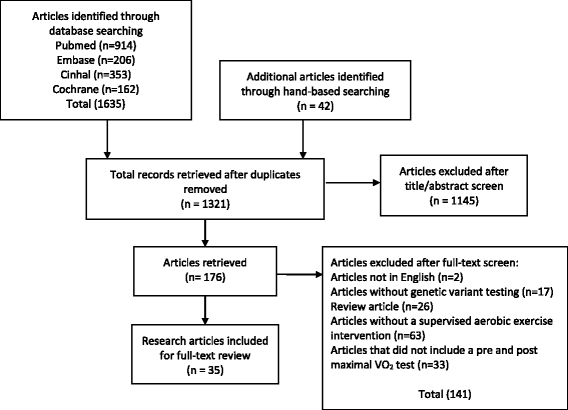Genes to predict VO2max trainability: a systematic review
- PMID: 29143670
- PMCID: PMC5688475
- DOI: 10.1186/s12864-017-4192-6
Genes to predict VO2max trainability: a systematic review
Abstract
Background: Cardiorespiratory fitness (VO2max) is an excellent predictor of chronic disease morbidity and mortality risk. Guidelines recommend individuals undertake exercise training to improve VO2max for chronic disease reduction. However, there are large inter-individual differences between exercise training responses. This systematic review is aimed at identifying genetic variants that are associated with VO2max trainability.
Methods: Peer-reviewed research papers published up until October 2016 from four databases were examined. Articles were included if they examined genetic variants, incorporated a supervised aerobic exercise intervention; and measured VO2max/VO2peak pre and post-intervention.
Results: Thirty-five articles describing 15 cohorts met the criteria for inclusion. The majority of studies used a cross-sectional retrospective design. Thirty-two studies researched candidate genes, two used Genome-Wide Association Studies (GWAS), and one examined mRNA gene expression data, in addition to a GWAS. Across these studies, 97 genes to predict VO2max trainability were identified. Studies found phenotype to be dependent on several of these genotypes/variants, with higher responders to exercise training having more positive response alleles than lower responders (greater gene predictor score). Only 13 genetic variants were reproduced by more than two authors. Several other limitations were noted throughout these studies, including the robustness of significance for identified variants, small sample sizes, limited cohorts focused primarily on Caucasian populations, and minimal baseline data. These factors, along with differences in exercise training programs, diet and other environmental gene expression mediators, likely influence the ideal traits for VO2max trainability.
Conclusion: Ninety-seven genes have been identified as possible predictors of VO2max trainability. To verify the strength of these findings and to identify if there are more genetic variants and/or mediators, further tightly-controlled studies that measure a range of biomarkers across ethnicities are required.
Keywords: Cardiorespiratory fitness; Predictor genes; Training; VO2max.
Conflict of interest statement
Ethics approval and consent to participate
Ethics approval from Bellberry.
Consent for publication
Written informed consent was obtained from the individuals involved in this study.
Competing interests
The authors declare they have no competing interests.
Publisher’s Note
Springer Nature remains neutral with regard to jurisdictional claims in published maps and institutional affiliations.
Figures
Similar articles
-
Home treatment for mental health problems: a systematic review.Health Technol Assess. 2001;5(15):1-139. doi: 10.3310/hta5150. Health Technol Assess. 2001. PMID: 11532236
-
Interventions for promoting habitual exercise in people living with and beyond cancer.Cochrane Database Syst Rev. 2018 Sep 19;9(9):CD010192. doi: 10.1002/14651858.CD010192.pub3. Cochrane Database Syst Rev. 2018. PMID: 30229557 Free PMC article.
-
Behavioral interventions to reduce risk for sexual transmission of HIV among men who have sex with men.Cochrane Database Syst Rev. 2008 Jul 16;(3):CD001230. doi: 10.1002/14651858.CD001230.pub2. Cochrane Database Syst Rev. 2008. PMID: 18646068
-
A rapid and systematic review of the clinical effectiveness and cost-effectiveness of paclitaxel, docetaxel, gemcitabine and vinorelbine in non-small-cell lung cancer.Health Technol Assess. 2001;5(32):1-195. doi: 10.3310/hta5320. Health Technol Assess. 2001. PMID: 12065068
-
Aerobic exercise interventions for adults living with HIV/AIDS.Cochrane Database Syst Rev. 2005 Apr 18;(2):CD001796. doi: 10.1002/14651858.CD001796.pub2. Cochrane Database Syst Rev. 2005. Update in: Cochrane Database Syst Rev. 2010 Aug 04;(8):CD001796. doi: 10.1002/14651858.CD001796.pub3. PMID: 15846623 Updated.
Cited by
-
Effects of Ashwagandha (Withania somnifera) on VO2max: A Systematic Review and Meta-Analysis.Nutrients. 2020 Apr 17;12(4):1119. doi: 10.3390/nu12041119. Nutrients. 2020. PMID: 32316411 Free PMC article.
-
Causes and Consequences of Interindividual Response Variability: A Call to Apply a More Rigorous Research Design in Acute Exercise-Cognition Studies.Front Physiol. 2021 Jul 22;12:682891. doi: 10.3389/fphys.2021.682891. eCollection 2021. Front Physiol. 2021. PMID: 34366881 Free PMC article.
-
Impact of the TTN C > T Polymorphism on Selected Variables of Aerobic and Anaerobic Capacity after a 12-Week Training Program.J Hum Kinet. 2024 Sep 26;94:117-125. doi: 10.5114/jhk/191847. eCollection 2024 Oct. J Hum Kinet. 2024. PMID: 39563773 Free PMC article.
-
Exercise Physiology From 1980 to 2020: Application of the Natural Sciences.Kinesiol Rev (Champaign). 2021 Aug;10(3):238-247. doi: 10.1123/kr.2021-0024. Epub 2021 Jun 30. Kinesiol Rev (Champaign). 2021. PMID: 35464337 Free PMC article.
-
A Multi-Center Comparison of O2peak Trainability Between Interval Training and Moderate Intensity Continuous Training.Front Physiol. 2019 Feb 5;10:19. doi: 10.3389/fphys.2019.00019. eCollection 2019. Front Physiol. 2019. PMID: 30804794 Free PMC article.
References
-
- World Health Organization. Chronic diseases and health promotion. 2016. http://www.who.int/chp/en/. Accessed 21 Oct 2016.
Publication types
MeSH terms
LinkOut - more resources
Full Text Sources
Other Literature Sources
Medical
Miscellaneous


